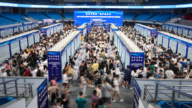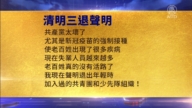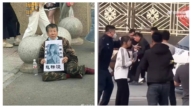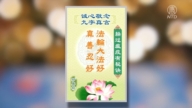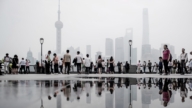【新唐人2013年09月13日讯】9月11号,北京发布了最新的“2013胡润百富榜”。上榜的前5名富豪的平均财富比去年翻了一番,前50名的资产至少达到180亿。在中国贫富悬殊不断急剧扩大的情况下,富豪财富依然暴增,以及高层政商之间的深层关系,再次受到舆论的关注。
胡润研究院发布的《2013雅居乐海南清水湾胡润百富榜》显示,大连万达集团董事长王健林以1350亿财富首次成为第十位中国新首富。
在上证指数比去年同期下降1.7%的前提下,上榜的1000位企业家平均财富却增长了18.5%,达到64亿元。前50名的上榜门槛达到180亿,为历年最高。
时政评论员刑天行指出,在中国老百姓看不起病,甚至一些人吃饭都成问题的情况下,富豪财富的增长,恰恰反映了中国经济极不正常。
时政评论员刑天行:“中国的财富,它是越来越明显的表现在集中在少数权贵的手中,它这个不正常的体制,给了特权阶层和利用特权阶层的商人,一个不正常的聚敛钱财的这么一个机会,所以他们的财富会急骤的上升。”
中国社会问题研究人士张健认为,在中国能达到富豪级别的商人,背后一定有中共高官撑腰。
中国社会问题研究人士张健:“政府官员与富豪这种官商的勾结,变本加利的盘剥了中国的大部分国有资源,盘剥所有贫下的老百姓的利益,将自己的利益和官商进行去分配,然后把他们所有子女,把他们所有的一切全都弄到了海外来享受这种奢靡的生活。”
日前,一份《中国国际移民报告》显示:个人资产超过1000万元的富人中,近60%已完成投资移民或有相关考虑。去年胡润报告说,超过85%的人计划将子女送到海外求学。
8月底大陆媒体报导说,据不完全统计,近十多年来至少有上百名有影响的民营企业家落马,包括至少23名福布斯或胡润百富榜上榜富豪,其中不乏担任两会代表等企业家。
刑天行:“(中共)不管是哪一任上台,他都要通过反腐去整治一批人,当然整治的也都是跟他自己利益关系不大太的,对他权力构成一定威胁的这一派,那么必然牵扯到这些商人,相继的要爱到一些惩处,从某种程度上说,对于商人来讲,他也是出于无奈。”
今年6月初,王健林曾经对媒体抱怨说:“现在形成了若干利益集团,国企、国资太强大,这就造成我们创业的机会成本越来越高。所以目前中国需要一次下决心的、落到实处的改革。”
张健:“在中国所有的富豪后边都有一个政府的体制作为一个背书,他们之所以落马,不是因为他们在自己经商的过程中犯了什么罪受到法律的制裁,只有你站错了队,才可能把你以前所有的问题纠出来。”
8月底,中共前政治局委员薄熙来案开审庭理。去年已被关押的大连商人徐明,被曝在90年代和薄熙来联系上以后成了亿万富翁。2005年,徐明曾位列福布斯中国富豪榜第八名。
刑天行:“如果中共是一个法制社会的话,这些富豪他不需要一定依靠权力阶层,他受到权力阶层挤压的时候,他也可以用法律来保护自己。”
张健指出,中国富豪排行榜曾经被称作杀猪榜,所以谁上排行榜都有可能随时面临着这样一个问题。他强调,在中共独裁体制下,谁都没有安全感。
采访编辑/李韵 后制/周天
A Shadow Behind China’s Rich List
On September 11, the Chinese authorities
released the latest “2013 Hurun Rich List".
The top five richest saw their wealth doubled. The top
50 richest have assets worth at least 18 billion Yuan.
In China, the gap between rich and poor has
rapidly widened, but tycoon wealth is still soaring.
Relations between the high-level leadership
and business is becoming a public focus again.
According to the latest Hurun’s rich list, Wang Jianlin
has been ranked as number one for the first time.
Wang is in charge of Dalian Wanda Group, and
has a fortune of 135 billion Yuan ($22 billion).
The Shanghai Composite Index
has fallen 1.7% year-on-year.
However, the top 1,000 richest people had their wealth
increase on average of 18.5%, or 6.4 billion Yuan.
The top 50 richest people reached 18 billion Yuan,
which is the highest growth ever.
Xing Tianxing, current affairs commentator:
In China, people can’t afford to see a doctor.
Some people struggle to pay for their food.
The increase of tycoons’ wealth precisely reflects
that the Chinese economy is far from normal.
Xing Tianxing: “China’s wealth is increasingly
being seized in the hands of the few elite.
This abnormal system gives opportunities
to the privileged class and businessmen.
They use the privileged class to seize
wealth, and their fortune rapidly increases."
Zhang Jian, China affairs expert, said that in China, support
from officials must be behind tycoon-level businessmen.
Zhang Jian: “Government officials colluded with
businessmen, and stole the majority of national resources.
They exploited civilian’s interests and re-distributed then.
They send their families and relatives
abroad, and live an extravagant life."
A “China International Migration" reported on rich
whose personal assets are more than 10 million Yuan.
60% of them had completed an investment
immigrant, or have relevant considerations.
Hurun’s report in 2012 reported that more than
85% of the rich sent their children to study abroad.
At the end of August, media in Mainland
China reported more than 100 well-know
private business owners were punished.
23 of them had been listed in the Forbes or Hurun Rich List.
Some of them served as representative
entrepreneurs at the CCP Two Sessions.
Xing Tianxing: “No matter who the new leader is, he must go
through an anti-corruption campaign to remove some people.
These people don’t link too much with his own interests,
and also those who pose a threat to his power.
This is certainly associated with some of
the entrepreneurs who were punished.
For businessmen, they feel they have no other choice."
In June, Wang Jianlin complained to the media:
“Now interest groups, state-owned enterprises
and state-owned resources are too powerful.
This resulted in the cost of starting a
business to become increasingly high.
Thus, China needs a determined and practical reform."
Zhang Jian: “In China, all tycoons have
a government group supporting them.
The reason for the removal of these businessmen, is not
because they committed crimes during business dealings.
It is because they stood in the wrong line."
At the end of August, former Politburo
member Bo Xilai was put on trial,
Xu Ming, a Dalian businessman who
was jailed last year, was exposed.
In the 1990s, Xu became a billionaire
after he managed to get support from Bo.
In 2005, Xu was listed the fifth
richest Chinese person in Forbes.
Xing Tianxing: “If China is a country ruled by law,
businessmen don’t have to rely on the power class.
If one is mistreated by power class,
he can use the law to protect himself."
Zhang Jian said that people who appeared in
China’s Rich List could face punishment at any time.
Under the CCP system, no one feels safe.


